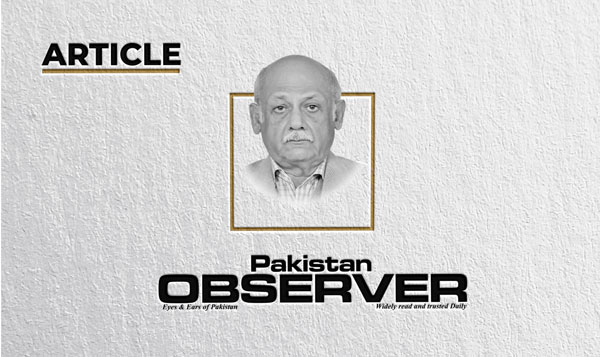The cancer of corruption in Pakistan
AMONG the community of nations Pakistan unfortunately has the dubious distinction of being one of the most corrupt countries in the world. According to Transparency International Denmark, Finland, New Zealand, Norway, Singapore and Sweden are perceived as the least corrupt nations in the world, ranking consistently high among international financial transparency, while the most apparently corrupt are Somalia (scoring 12), Syria and South Sudan (both scoring 13) Pakistan received a score of 28 in the 2021 Index, where the highest-scoring country received a score of 88 and the lowest-scoring country, 11. Pakistan ranks 89th out of the 131 economies included in the NRI 2022.
The most common definition of corruption is the misuse of entrusted power for private benefit and this shameful phenomenon is widespread and endemic in Pakistan taking on the form of malignant tumor that is eating away the very foundations of the country. Corruption has seeped into every segment of our society and today not a single office of the nation is immune to this deadly cancer. The tentacles of cancer has spread to every organ of the state from the executive to the judiciary and the legislature and it will not be wrong to say that the entire body of the state is now suffering from this malaise and drowning under the weight of this deadly disease.
Over the years the acceptability of corruption has increased in our society and there seems to be no evidence that people feel guilty about their own role in corruption. There was a time when the corrupt members in the service of the country were ostracized and faced social boycott but today all ill-gotten wealth is flaunted with impunity and there is just no shame or embarrassment shown in wealth acquired by illegal means. The scale of corruption is highest in development projects and procurement contracts floated by the defence services and public sector corporations. Mega corruption is clearly evident in development projects, lucrative postings, bank loans and write offs and supply contracts that affect the very foundations of our economy. The common citizen affected in the petty and middle level corruption that he has to face every day in government offices and corporations.
According to estimates by international agencies the total loss to the national exchequer is over Rs 200 billion per annum. This loss is the result of corruption in all the government departments and agencies and the most prominent government departments according to the Perception Survey carried out by Transparency International are Income Tax and customs, Police, Judiciary, Health and education, Land administration, power sector and the defence services. The roots of corruption can be traced back to the British colonial period when the colonial masters awarded lands and titles to those who showed unflinching loyalty and this led to nepotism and corruption. We can pinpoint two major crises that played a major role in the genesis of corruption in the Indian sub-continent firstly the spiral in the defence related contracts and procurements during and after the Second World War and allotment of evacuee property after the partition in 1947. This was compounded by industrial and trade licensing and official patronage schemes like bonus voucher and route permits in the 1950s and 60s.
The policy of nationalization during the Bhutto era in the 1970s resulted in new opportunities for corruption and created a new breed of greedy and corrupt government officials. The actual causes of this widespread disease in our society are based in the socio-cultural and political matrix of our society. According to Perception Survey carried out by Transparency International Pakistan in 2004 major causes of corruption in Pakistan are lack of accountability, Low salaries, Monopoly of power, discretionary powers, influence of the political elite. According to a leading expert on corruption “Corruption is not a problem that can be attacked in isolation. It is not sufficient for the criminal law to search for bad apples and punishthem. Of course, the state may need to establish credibility by punishing highly visible corrupt officials, but the goal of such prosecutions is to attract notice and public support, not solve the underlying problem. Anti-corruption laws can only provide a background for more important structural reforms”
Poor governance leads to, and encourages and breeds, corruption in a number of ways, for instance through bribery and extortion, nepotism and fraud and embezzlement, It reduces the efficiency on which an economy depends, and by increasing the cost of investment, lowers the potential return. It also reduces the government’s resources and hence its capacity for investment. Common to other South Asian countries, corruption in Pakistan is unique because it occurs upstream, it has wings which encourage flight of capital rather than wheel which encourage reinvestment and it often rewards rather than punishes as the legal processes to fight corruption are weak in themselves and the lower judiciary is amenable to letting off the accused if the ‘price is right” Eradication or at least control of corruption at the national level is possible only and only by taking certain steps such as setting up of a anti-corruption commission as an independent watch dog, ending old and archaic discretionary laws, ensuring time bound action in offices, use of independent private sector auditors, all illegal money and property transactions in foreign countries to be treated as drug money, All public officials to declare their assets, poverty alleviation and economic reforms and above all an honest and efficient elected government










